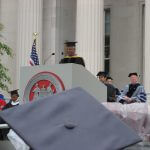14 MLK Quotes to Change the Way You Think About Education
 Martin Luther King, Jr., would have been 88 years old on Jan. 15, 2017, had he lived to see it. Unfortunately, an assassin’s bullet prevented that on April 4, 1968, just a few months after his 39th birthday.
Martin Luther King, Jr., would have been 88 years old on Jan. 15, 2017, had he lived to see it. Unfortunately, an assassin’s bullet prevented that on April 4, 1968, just a few months after his 39th birthday.
But the legacy of Dr. King lives on through his legendary “I Have a Dream” speech and his work in peaceful resistance.
King was about as radical of a reformer as you could find, but he was also staunchly against the violence and rioting of some of his peers. You get a sense listening to Dr. King that if he were alive today, he would have some thought-provoking advice for blacks and whites alike, and it would cause all of us to take a deeper look inside of ourselves.
We know this because the words he has said that still exist accomplish this fine on their own almost 50 years after his death.

From an educational standpoint, Dr. King had a lot to say, and we’d like to take this occasion to break down 14 of his most brilliant. In some cases, these quotes are not directly related to education but certainly apply. Let’s get started.
MLK Quotes No. 1. Change does not roll in on the wheels of inevitability, but comes through continuous struggle. And so we must straighten our backs and work for our freedom. A man can’t ride you unless your back is bent.
During an age where people live with the very real fear of having robots take their jobs, this quote serves as a reminder that decision-making in the career paths we choose as well as putting in the hard work to achieve will be more important than ever.
If you are concerned about your future, try to figure out where the future is heading. That will allow you to find your place in it, and it will make it easier to pivot and adjust as changes happen in the marketplace.
2. I look to a day when people will not be judged by the color of their skin, but by the content of their character.
Racial equality has certainly taken a hit in the last eight years, but consider how close it is to us now compared to where it was in Dr. King’s day when racism was overt, deadly, and commonplace.
While there is still more work to do, the country has elected an African-American President twice and more than 66 million would have likely voted for him a third term if Hillary Clinton’s support translates.
Whether you liked the job President Obama did, going from “Whites Only” to an African-American President in 50 years is significant racial progress not to be dismissed.
What does this have to do with education? Everything!
If we now live in a world that is so different from the one of 1968, further progress is inevitable regardless of the results from one or two elections, provided that we continue to trust in the system. With the playing field starting to even out, one’s accomplishments inside the classroom will be more important than they have ever been.
3. A genuine leader is not a searcher for consensus but a molder of consensus.
It is said that we create the worlds that we want for ourselves. People who stand on the sidelines and allow others to do it for them may not like the results they receive. The best thing to do is to take charge of your own destiny, and you cannot do that without an education.
4. Nothing in all the world is more dangerous than sincere ignorance and conscientious stupidity.
“Sincere ignorance” and “conscientious stupidity” were probably the two most damaging things African-Americans had to endure during the span of time from slavery to the Civil Rights Era of the 1960s.
On the one hand, many white people didn’t want to change their racist ways because it would mean having to question everything they were taught and all the people they loved who had a hand in raising them.
On the other, you had individuals, who were so sincerely ignorant of what was going on that they allowed great human rights abuses to occur.
In an educational context, these words ring equally true. If you are the type of person who is conscientiously stupid, then you are making a decision to go against quantifiable facts. But if you are sincerely ignorant, you never attempt to broaden your level of understanding.
Either path can create deadly real world scenarios.
5. Human progress is neither automatic nor inevitable… Every step toward the goal of justice requires sacrifice, suffering, and struggle; the tireless exertions and passionate concern of dedicated individuals.
This one sounds a lot like No. 1, but the words we want to focus on here are “sacrifice, suffering, and struggle.” Too many students, before heading off to college, assume that a degree will be the answer to all their problems.
Not the case.
In order to design the job and the life that you want, you have to be willing to set aside comforts, endure hardships, and struggle against classes, professors, debts, and more.
6. The ultimate measure of a man is not where he stands in moments of comfort and convenience, but where he stands at times of challenge and controversy.
Piggybacking onto No. 5, this quote challenges you to examine your own actions and character. How will you respond at the first sign of trouble or, worse, throughout a continuous series of struggles and setbacks, which make up the fabric of your educational journey?
7. The function of education is to teach one to think intensively and to think critically. Intelligence plus character – that is the goal of true education.
How many college students need to hear this nowadays? While it is understandable to be incensed against speech with which you disagree, the recent actions of students toward controversial speakers like Ben Shapiro and Milo Yiannopoulos have been deplorable.
College campuses are places where you should be challenged, even when you are in the right. But with protest groups effectively shutting down the aforementioned speakers before they can begin — in one case, a speaker even had excrement thrown in his face — students are effectively rejecting critical thinking.
They lack character and are instead intent on shutting out any form of dissent. This stunts intellectual growth, endangers free speech, and, by extension, the future of a free society. It is safe to say Dr. King would be appalled, not by these students exercising their freedom to protest but by turning their protests into the slightest form of violence.
8. Whatever your life’s work is, do it well. A man should do his job so well that the living, the dead, and the unborn could do it no better.
There is an old saying in the world of careers and entrepreneurship that sometimes you have to do what you don’t want to do in life before you can do what you do want to do. More specifically, sometimes the grunt work is the necessary building block to a better life.
Dr. King’s statement, however, goes beyond this idea and removes the excuses. Essentially, anything done is worth doing well, and if you are the person who takes pride in your work, no matter what that job is, you will leave the world a better place than you found it with a better life than you would experience through the alternative.
9. Seeing is not always believing.
Our YouTube culture proved Dr. King correct. Video appeals to sight, but it can be manipulated either directly or through the omission of context.
In order to achieve a true education, you must maintain healthy skepticism in all things, even in the realm of sight.
10. All progress is precarious, and the solution of one problem brings us face to face with another problem.
If ever there was a quote that endorses the concept of becoming a lifetime learner, this is it. The most successful people in life understand that their job is essentially to never stop learning. Even if you achieve the highest pinnacle of your degree path, you fail if you decide to stop educating yourself.
The plates are always shifting and a true education must change with the times and not simply be a set of finite ideals that run out like the storyline of some video game.
11. Violence as a way of achieving racial justice is both impractical and immoral. I am not unmindful of the fact that violence often brings about momentary results. Nations have frequently won their independence in battle. But in spite of temporary victories, violence never brings permanent peace.
Dr. King would be disgusted with the riots of Baltimore and Ferguson. That’s not guesswork because he tells us that in this quote. He understood violence begot violence just as nonviolence, long term, begot a nonviolent response.
It is no accident the practice of lynching no longer happens with the frequency and regularity that it did in the 1960s and the decades leading up to it. Dr. King’s example of peace impacted race relations in a positive way that constructed a useful dialogue between blacks and whites that led to great advancements in modern society.
It’s why he is still remembered 50 years after his death as one of the most important figures of the 20th Century.
On the educational plane, “violence” can mean any time you take the easy way out. You may enjoy temporary gains, but you’ll never achieve true knowledge and understanding.
12. When you are right you cannot be too radical; when you are wrong, you cannot be too conservative.
Of all the MLK quotes presented here, this one is a top five favorite. Radical knowledge has led to more advancements in areas of technology, healthcare, and science, and we as a society are the better for it.
Just remember that when you are right, you should be emboldened by that knowledge and press forward in ways that reflect it. When you are wrong or uncertain, don’t go too far down the rabbit hole.
13. Rarely do we find men who willingly engage in hard, solid thinking. There is an almost universal quest for easy answers and half-baked solutions. Nothing pains some people more than having to think.
Students are not the only people who need to hear this. There is a whole culture of fake news on the right and the left of the political aisle. People seek out “news” that affirms their beliefs because it’s easier to live with being right than the possibility of being wrong.
The world of today needs more “hard, solid thinking.” It needs to have viewpoints challenged and investigated rather than constantly affirmed. Dr. King understood this. That’s why reading through a list of MLK quotes will make many people feel dumb.
He came up with some brilliant stuff not because he was born brilliant, but because he had put in the work and didn’t need someone else telling him what to think or say or feel. It all came from his quest for knowledge and his desire to understand those with whom he disagreed.
14. Shallow understanding from people of good will is more frustrating than absolute misunderstanding from people of ill will.
What’s the old line? “The road to hell is paved with good intentions”? Dr. King understood that the right sentiment meant little if it didn’t translate into action.
At least with “people of ill will,” you knew exactly what to expect, Dr. King rightly thought. With the shallow “people of good will,” intent never translated to meaningful change. As the Bible, a book Dr. King was quite fond of, would say, “The spirit is willing, but the body is weak.”
In closing
Which of the MLK quotes shared above are your favorite, and do you think that we still have a lot to learn from Dr. Martin Luther King, Jr.? Sound off in the comments section below.
[Featured Image by Biography]








